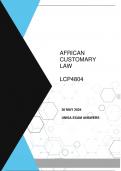Tentamen (uitwerkingen)
30 MAY 2024 EXAM ANSWERS - LCP4804 ADVANCED INDIGENOUS LAW (Answers are professionally drafted and not AI generated)
- Vak
- Instelling
LCP4804 QUESTIONS Question 1 With the aid of decided cases of critically discuss the differences between living customary law and official customary law and indicate why the living customary law is held to be more aligned to the transformative value of customary law in South Africa. [25] Questio...
[Meer zien]




